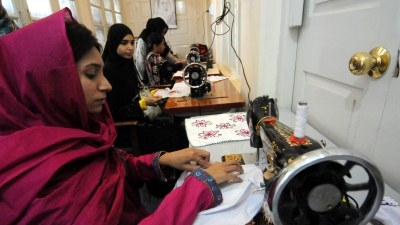HYDERABAD, Pakistan – Most days, camel carts piled impossibly high with parcels and produce lumber past the building where Mohammed Tahir Bhatti is learning cutting-edge computer skills.
But Bhatti, 25, is too absorbed in his classes on Web design and complex software to notice whether any of the camel drivers come from his village near Pakistan’s southern city of Hyderabad. In fact, he’s determined to leave behind the low wages and hard labor of agricultural life. Instead, he hopes a new program, called the Sindh Skills Development Project, will help him, and thousands of other young people, learn modern, more marketable skills.
“These computer courses will be good for better employment and a better life,” says Bhatti, who studies at Khowaja Institute of Information Technology. “Otherwise, there is absolutely nothing in my district that can offer this.”
Training unemployed youth
Started last year, the skills development project, overseen by the Sindh government with financing from the World Bank, aims to train 50,000 unemployed youth by offering them short technical courses on a range of jobs, including fashion design, engine mechanics, multimedia graphics, architectural design, call-centre operations and numerous other trades.
At present, many of the young people in Pakistan who manage to complete their Class 12 education still don’t have practical, marketable skills. It’s estimated that less than 1% of the population has any technical education or vocational training. There are also fewer job opportunities for women and those from rural areas.
But now, the Sindh Skills Development Project is supporting technical courses at approved institutes throughout the province.
To attend his computer program, Bhatti travels two hours back and forth daily in the intricately painted buses that ply Pakistan’s roads. A round trip costs him 400 Pakistani rupees (about $4), a sum that his family struggles to afford. But it’s an investment in the future, he says. “I am confident that I will now get a good job from this course.”

